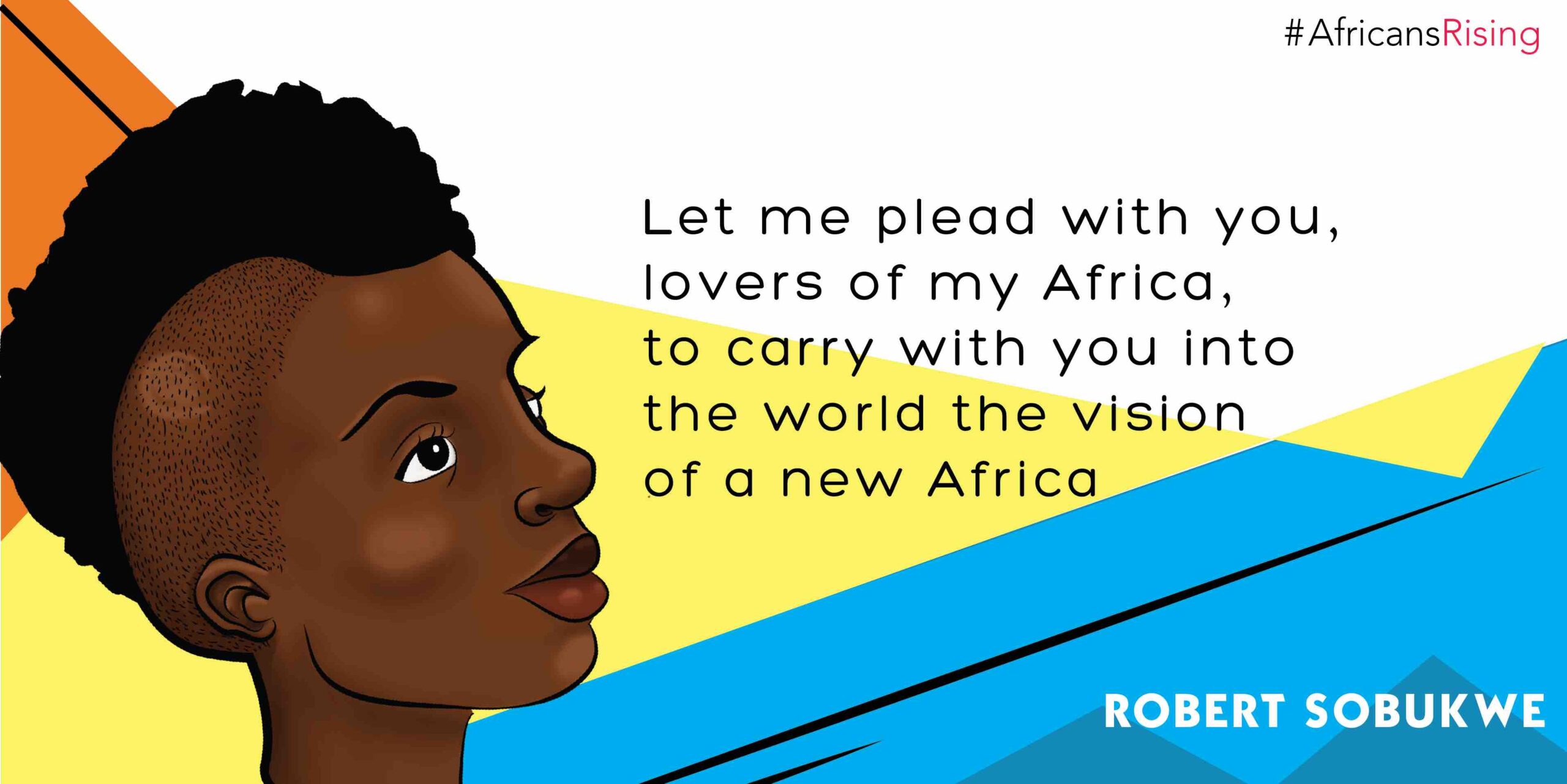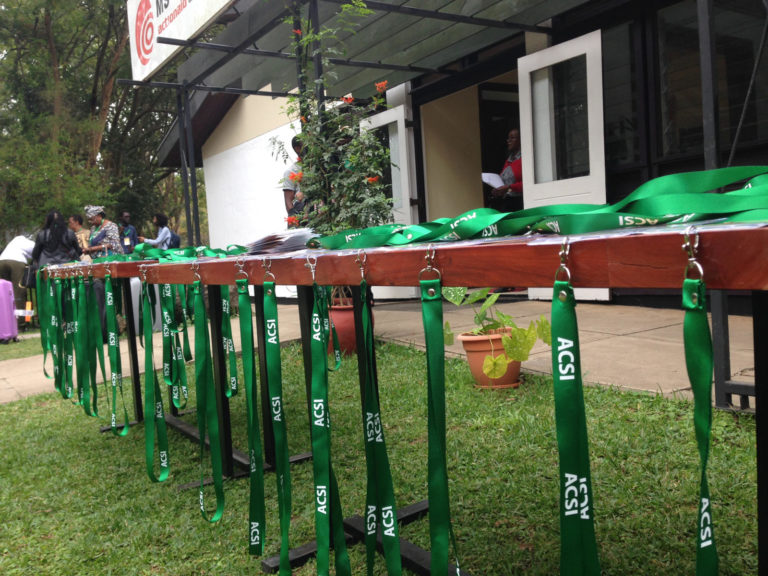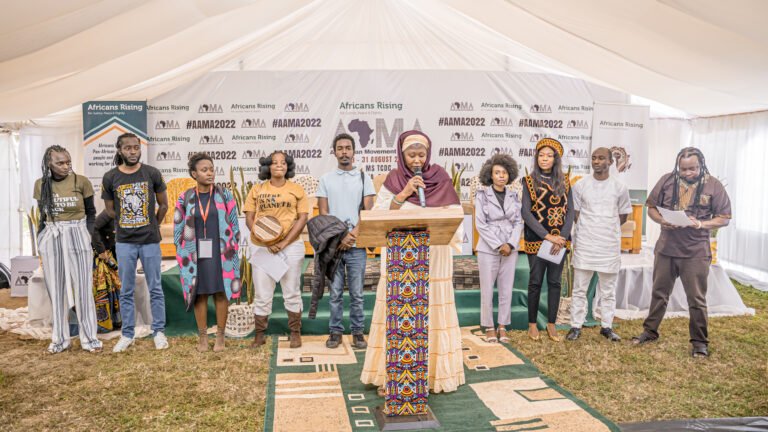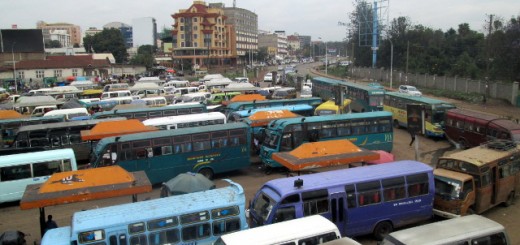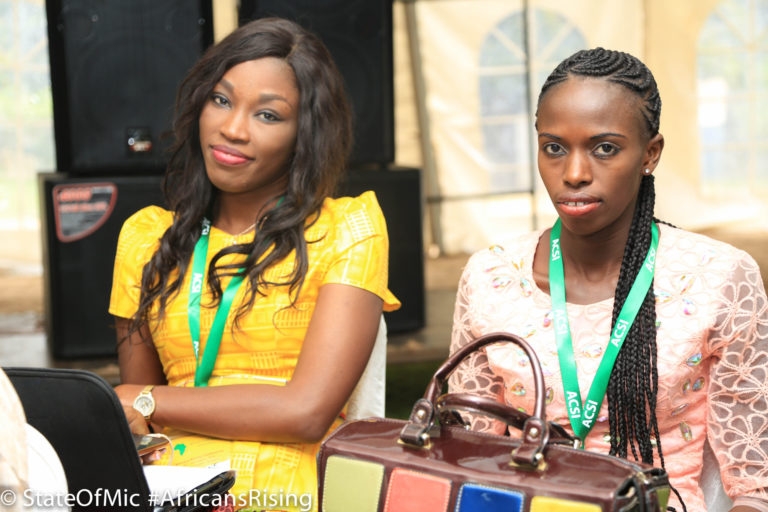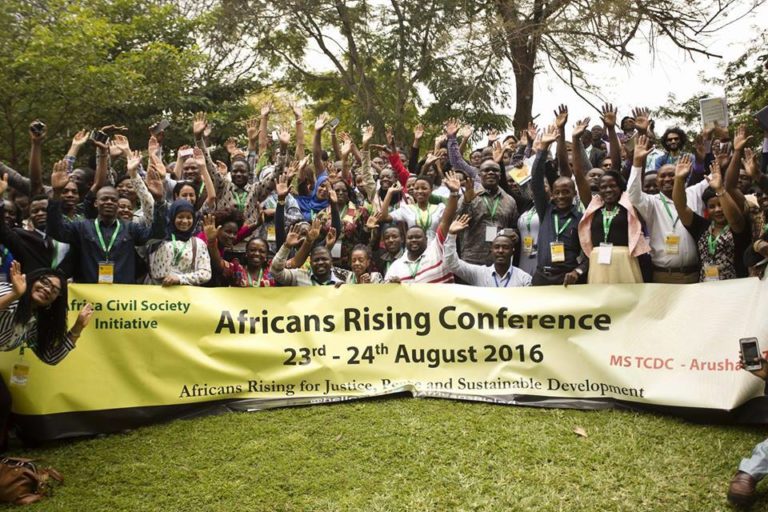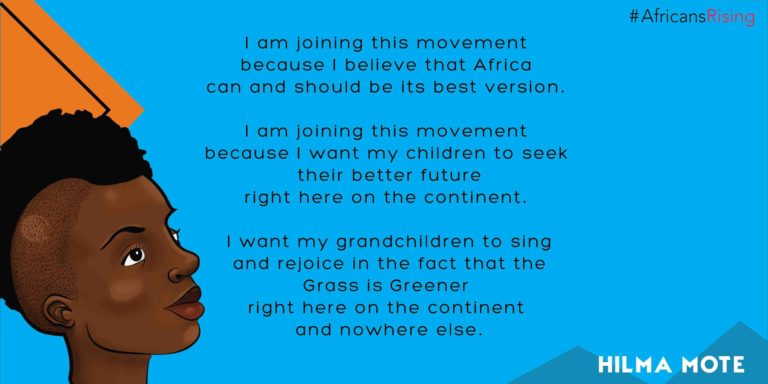This document is an earlier draft of the Vision document
This document was drafted during the validation conference in August 2016. The current vision document published on the 30th September 2016 after feedback from the conference.
INTRODUCTION
Over the past few years various global institutions and media have repeatedly referred to the phenomenon of “Africa Rising” to describe the growth story of Africa. It is often reduced to increases in gross domestic product (GDP) of some countries. However, the celebration of this economic growth story takes place while the majority of people on the continent continue to suffer marginalisation, deep poverty and inequality. This is not the story of inclusive development that respects the culture, heritage and human rights of all African people. It is in many instances characterised by the devastation of our natural environment, the displacement of multiple communities, major land grabs and massive illicit financial flows that deprive the public purse of resources to ensure the delivery of services by governments. Indeed, the challenges we face are not that different from those of hundreds of millions of people all over the world. The current economic system is deepening inequality and the level of state capture by the 1% super wealthy in “developed” and “developing” countries.
It is against this backdrop that discussions have taken place about a new broad-based African civil society initiative that will seek justice, peace and inclusive sustainable development driven by people from below and that is not confined by borders. During these discussions, some consensus points have emerged. While these are set out below, they should not be regarded as fait accompli for the new civil society platform. The intention is to reflect some consensus on possible pathways towards establishing the network; what would make the processes and outcomes of this one different from previous attempts at creating civil society unity; and how consensus can be achieved.
CONTEXT
It is common knowledge that Africa draws its modern history from the Berlin Conference held between 1884 and 1885, which sought to legitimise control over the continent, its people and its natural resources without consulting Africans. The fact that, by 1900, European states had claimed almost 90% of the land mass, ignoring and abolishing the local autonomy and self-governance of the African people, explains why many of our countries do not make sense from a cultural, linguistic, environmental, economic, geographical, or any other perspective. They only make sense from a colonial mindset of racial superiority that reduced people to commodities that could be traded, enslaved and abused.
While this is a reality we must deal with, we as Africans must rise above that and ensure that we push for maximum, economic, social, environmental and cultural cohesion and integration. With regard to monetary union for example, we should be asking ourselves questions such as, “If Europe can have a Euro then why can’t Africa have an Afro?”
The overwhelming majority of countries are not able to stand as effective players on the global stage and, on their own, lack the bargaining power to push a continental agenda on a range of important global issues from industrial policies that see greater beneficiation of mineral resources, to tackling the effects of climate change, the reform of the United Nations and other multilateral institutions governing global rules on everything, from the financial sector to trade. We need to advocate greater regional integration and it is only a united, well-informed and organised grassroots movement underpinned by a commitment to solidarity that can champion and help realise the full potential of Africa.
It is an indictment on African civil society that we are not able to galvanise solidarity and support when activists face repression and sometimes extreme violence when campaigning for greater transparency, accountability and freedom of speech, assembly and association. Usually the first voices to raise the alarm are from outside of the continent. This allows governments to demonise and dismiss those concerns as foreign interference. If we are to achieve our vision of social progress that prioritises the basic needs of all people and espouses the environmental care that preserves our beautiful continent for future generations, we need to unite and organise a powerful pan African movement that is not restricted by colonial borders. We need to start building that future now.
Increasingly the demands by people for locally driven economic development that respects human rights, gender equity and workers rights have been met by force. The response of those in power to peace and security is greater militarisation and repression. When we measure governance, through Indexes such as that of the Mo Ibrahim Foundation’s Index of African Governance, we find sub-par and uneven delivery on key indices of human development. Corruption is becoming endemic and people are losing trust in the very institutions that are supposed to promote democracy.
What we need is a civil society that is independent, accountable, operates with a mandate and is sensitive to what people want. We must work to co-create the vision, strategy, leadership and tools for communities and different sectors to take up their own struggles. The role of the envisioned movement is to be one with a light touch, which is a coordinator of a network of networks rather than one that creates a new layer of bureaucracy.
We need a civil society that can robustly push governments, business and even established global and national NGOs to focus on challenges we deem critical, including demands for a fair global trading system, concrete action to address the effects of climate change and the building of a representative coalition to protect our natural resources and the environment. In this context we are prepared to work with our governments on global stages to win these battles. But it must be done within a framework that restores peace, fosters unity and deepens accountability and good governance.
Time is running out. We are already witnessing the havoc wreaked by extreme weather conditions due to climate change. Many countries are battling drought and intensifying desertification has fuelled conflicts as people fight over scarcer resources such as water, food and grazing land. Traditional livelihoods are being threatened and displacement of people is driving rapid urbanisation in many African cities that lack the resources to cope. The enormous strain on urban centres is adding to the growth in informal housing where there are numerous risks and in which health and other problems such as infant and maternal mortality are spiralling out of control.
We need a holistic approach so that the displacement and enforced migrations of people brought about by conflicts and the effects of global warming are tackled in a humane and compassionate manner. It is also important to build solidarity among people so as to prevent, for instance, the kind of xenophobic violence we have seen in South Africa over the last decade.
CIVIL SOCIETY POISED TO PLAY KEY ROLE
A key question is: what is civil society? It is traditionally understood to be the space between the market and the state, where citizens voluntarily associate to advance common interests through, among others, grassroots movements: non-profit organisations; faith based movements; sports organisations; cooperatives; trade unions; village committees and burial societies. But often the term “civil society organisation”, is used interchangeably with NGOs who have varying degrees of influence, access to power and financial resources. The focus of this initiative needs to ensure that civil society organisations, especially NGOs, act as catalysts and support the leadership of social and grassroots movements.
The Africa Civil Society Initiative, in its consultations starting in October 2015, involved not only respectable networks of NGOs such as the Southern African Development Community (SADC) Council of NGOs and the West African Civil Society Forum, but included the African Religious Leaders’ Council as well as the African Trade Union Congress.
The social media revolution also presents new opportunities for mobilisation and we have seen citizens effectively organise in a more informal manner. They include the anti-corruption campaign in Nigeria called ‘Enough is Enough’, ‘FeesMustFall’ in South Africa, and the resistance movements that challenged authoritarian rule in countries in North Africa, starting off in Tunisia. They all have different approaches to organising and leadership and have to be integrated into our discussions to ensure that transformative and systemic changes happen across the continent.
Our analysis of civil society today must concede that many organisations are disconnected from the very people they purport to represent and use to justify their existence and in whose names resources are raised. People have also begun to lose trust in the organisations that are designed to serve them. Our consultations have shown that there is an honest recognition of this fact and one of the questions raised about many civil society organisations – in particular about their leaders – is whether they have become part of the system they are meant to be challenging.
Is our house in order? Is the lifestyle of our leadership aligned to the people on the ground or those who dominate the system that traps so many in poverty? How do we respond to the accusation that we are part of the elite or even the top 1% in society? In order to be taken seriously by our governments, business and other players, we need to ensure that we do not replicate the behaviour of those we criticise.
We all know of people who have stayed in executive director roles for far too long or until funding runs out; are excessive in the use of resources on themselves instead of for organisational purposes; and perpetuate the culture of people only contributing to causes when paid to do so. This contradicts one of the central ideas underpinning civil society, which is the willingness of people to take voluntary action for the public good and to put their lives, their time, and their reputations on the line without necessarily expecting compensation for everything that they do.
We must also acknowledge that too often civil society organisations in Africa are influenced by external power relations. While it is not generally true that the agendas pushed by international NGOs are necessarily those of their national governments, it is still worth noting that sometimes we practice self-censorship or contort ourselves to fit into the funding guidelines of international NGOs and foundations. That then distracts us as, instead of focussing on our struggles for social justice, we redirect our energies towards fragmented projects and the kind of detailed reporting and other prescriptions merely meant to meet the narrow needs of donors.
Historically, local economies always had a marketplace for the exchange of and trade in goods and to ensure that people’s basic needs were met. In modern times, the idea of the marketplace has been hijacked and dominated by transnationals who have used their power to monopolise goods and services and to amass great power and wealth for themselves and their shareholders. In the name of globalisation local economies have been decimated, indigenous knowledge suppressed and Africans have become bystanders in development. The economy is a terrain to be contested. As the technological revolution has fundamentally transformed how we live, organise, access services and information and the way we work, we have to ask ourselves whether the benefits of this digital revolution has not, in some instances, increased inequality.
It has certainly transformed many aspects of our lives and given rise to a new sector of social entrepreneurs and communities. Therefore we must examine how we can harness new technologies and platforms so as to pressurise the business community into showing more public spiritedness and governments into supporting the growth of community-owned assets. How would we use the power of citizens to drive industrial policies and strategies that see greater beneficiation of commodities so that African economies can leapfrog into a more prosperous era in which all citizens benefit? There are cutting edge projects we can embrace, such as the decentralisation of energy ownership through renewables.
Another key question is: what kind of partnerships do we cultivate with progressive business leaders who are committed to inclusive economic growth and to opening up more opportunities for youth?
A further question: should we push for environment where-in donations by business and individuals are encouraged through tax incentives, thus ensuring that resources are mainly generated on the continent? While we should continue to harness support, including financial, from our partners internationally, we need to raise substantial funding from people, foundations and businesses on the continent. After all, our experience is that leaders always find resources to sustain their own needs and military ambitions but are often unable to finance health, education, water or other services.
While there are some battles we have won, we must, however, concede that we are still losing on many fronts and that our desire for the protection and respect of the dignity of all Africans is far from being achieved. Let us remember what Amilcar Cabral, the anti-colonial leader of Guinea Bissau, once said, “Tell no lies. Expose lies whenever they are told. Mask no difficulties, mistakes, failures. Claim no easy victories.”
We ought to reflect on how this initiative can learn from past attempts so as to rise to the challenge of building an ethical, values-driven, and effective civil society. Because it is only through commitment, dedication and a willingness to listen with humility that we will be able to lay the foundation for a better future especially for women and children.
THE ORGANISING APPROACH
The organising approach would be symbolic of one best described as a “starfish” instead of a “spider”. It would rely on more decentralisation, similar to that taken by the Occupy movement or the Arab resistance to dictatorship. We have access to critical technological tools that help to expose corrupt leaders and empower communities to take initiative and act on their own. Our focus would be to demystify this knowledge, innovate and make them accessible.
Some of the features of a decentralised organisational structure (starfish) that promise to serve this initiative well include:
- The ability of decentralisation to further open up, expand, contract, rebuild and/or mutate in response to attacks because it is fluid and agile and does not rely on a head/heads for its health or survival;
- The natural tendency for intelligence to spread throughout the organisation and not remain concentrated in any central point;
- The capacity to spontaneously coordinate and take up issues because there is no bureaucracy and therefore catch adversaries unawares;
- The ability to stimulate people’s interest and eagerness to contribute towards the goals of the initiative;
On the other hand, some features of a centralised organisational structure (spider) that would serve the initiative well, include:
- Identifiable, accountable leadership that has the capacity to maintain the necessary focus, particularly at nascent stages of development;
- A coordinating centre/headquarters and clear division of roles and responsibilities with the ability to: level the playing fields for those members who may otherwise be disadvantaged by constraints to their participation; offer confidence to stakeholders, in particular, funders operating within conventional funding systems; and
- Identifiable membership governed by agreed policies, systems and procedures.
Whereas there are clearly synergies between the starfish organising approach and the rationale for, and ethos of the initiative, some may nevertheless argue that at the early stages of its formation, the initiative must have a hybrid nature incorporating a lot of the starfish and some of the spider characteristics.
For instance, the role of the executive director could be defined so that the incumbent serves more as a catalyst; an inspirational, collaborative peer, who acts on the basis of trust and helps establish an environment that is conducive for the initiative to authentically and consistently be a learning organisation.
The role of the board, for example, could also be catalytic and based on trust, ensuring that an appropriate ideology holds together the initiative and its self-organising teams and circles. It would respect the autonomy of members, their rights to equality and their freedom to associate and disassociate as they please. It would be important that the chairperson had excellent people skills, is visionary and possessed the energy required to champion the cause/course of the initiative. In order for decentralisation to be meaningful, it is apparent that the leadership structure must remain lean and but must instead facilitate the self-organising capacities of civil society while ensuring that a diversity of voices have fair representation. Traditional notions of a central bureaucracy that is vested with financial and other resources and distributes them as it deems fit, must be avoided. Instead a range of approaches that will facilitate access to funding sources of funding for all members should be explored.
Digitisation and other technological advances mean decentralisation can be made easier.
PROGRAMME OF ACTION
Advocacy: Mobilising solidarity when civil society is under threat in any country. This will entail liaising with external partners to ensure that their solidarity messages do not play into the hands of repressive governments and to ensure that their comments and interventions take into account the views of the communities directly affected. A civic space tracker will be required to collect and assess threats and ensure that fellow Africans stand up for those who are vulnerable. Additionally, part of our advocacy must include early warning systems; rapid responses to conflicts; and efforts to foster peace in conflict situations.
Knowledge Curation: The formal definition of knowledge curation is the collection, management, sharing and inter-linkages between and within discrete and overlapping theoretical and experiential frameworks. In practical terms this entails identifying key information that will enable effective advocacy while ensuring that the appropriate information is available using online capabilities. A key component of knowledge curation is sharing through formal and non-formal channels that recognise the prior learning in our communities while helping to empower them. Using existing tools, Africans Rising will seek to create dynamic online learning and information sharing platforms to help Africans learn from each other’s successes and failures.
Leadership Development: Africa has considerable and widespread talent. This is particularly true of young leaders who in the last decade have shown innovation in disrupting ingrained unjust practices. We need the kind of leadership that would be taken seriously now and in the future. We should seek dynamic ways to generate a large number of ethical leaders who are committed to service and who display the appropriate values, lifestyles and approach towards the initiative. Developing an inter-generational leader corps that is strategic should be the focus.
Alliance Support: Africans Rising must develop the capability to support alliances that emerge from local, national and regional struggles aimed at addressing gender inequality; inequality and poverty; mitigating the effects of climate change; defending and deepening the democratic space; and assertively tackling corruption.
Strategic Convening: There are many structural and systemic challenges across the continent. Many, such as land grabs, the effect of climate change, the shrinking of the democratic space and corruption, will certainly not be addressed by service delivery improvements alone. We need to get the best minds from across the continent and in the Diaspora to work together to develop plans to address them at local and continental level. Africans Rising will succeed not because of grand continental-wide campaigns but because of a multitude of smaller, locally relevant, people-driven initiatives.
GOVERNANCE FRAMEWORK
BACKGROUND
For several decades there have been attempts to foster African-wide solidarity and unity, either generally or around specific issues. Alliances have attempted to coordinate and unite civil society but none of them have been successful at achieving the outcomes originally envisaged. Some of the reasons behind these historical failures include deficiencies in governance structures, resource challenges as well as leadership and management barriers. Therefore, it is critically important that the Africans Rising initiative learns from previous challenges to ensure that we do not repeat them.
Some of the major governance weaknesses were attributed to the fact that board members of African networks invariably tended to be leaders of prominent civil society organisations. Challenges therefore arose because their full-time responsibilities often left them with limited time to attend to the responsibilities of the African-wide effort. This meant that too much of the responsibilities were left with full-time staff who – as a result – tended to regard the board as a rubber-stamping mechanism. The efficacy and/or continued existence of African networks have been stifled by conflicts of interest between those of the board members’ organisation on the one hand, and the collective interests of the alliance or network on the other. The third problem was a lack of “ownership” by members due to the absence of a rigorous membership system.
Set out below, therefore is a governance framework that seeks to take into account the past failures and lessons learnt from previous attempts to establish African networks.
MEMBERSHIP
It is proposed that Africans Rising should be inclusive of all African citizens, civil society organisations, trade unions, faith-based organisations, social movements, cultural formations, intellectuals, non-governmental organisations, the African Diaspora and other organised citizen formations. However, while the initiative intends to be inclusive, the primary focus must be on addressing structural and systemic changes rather than primarily on service delivery. This is based on a view that improvements in service delivery alone will not address the tremendous challenges that Africans face daily given the fundamental problems associated with governance, policy development and implementation.
It must be noted that the distinction between policy development and policy implementation is quite significant because, while the African Union (AU) has developed reasonably good policies on a range of global challenges including inequality, gender equality, the environment and climate change, youth and poverty eradication, there remains a huge gap between the development of such policies and their implementation by member states. However, therein also lays the opportunity to hold national governments accountable for commitments that they have bound themselves to at the AU level. For instance, the AU Agenda 2063 includes aspirations for a peaceful, secure and integrated continent with better governance and greater democracy by 2063.
TOWARDS A MEMBERSHIP DRIVEN MOVEMENT
Ideally a modest membership fee must be charged based on affordability. However, no organisation must be denied membership based on financial constraints.
It is therefore envisaged that membership will span a range of categories, including; the conventional organisations that are duly constituted and registered; individual membership; African Diaspora membership; and an option of associate membership for global partners.
Appropriate internal policy guidelines must therefore be developed to make the membership system effective. This could include mechanisms that will allow for meaningful participation of informally organised movements and individuals. Though the use of social media networks is likely to help expand inclusivity and participation, policy must take into account the reality that many African citizens have limited or no knowledge of what civil society organisations are or what they do. Where they do know, there is often a lack of connection between civil society organisations and the populations they seek to serve. Civil society organisations are seen as part of the problem in some countries, and in others, as part of the elite. Most Africans are not formally part of existing civil society organisations and the absence thereof is sometimes a consequence of the shrinking of the democratic space. We must therefore aim to address the challenge of weighting the voices of more formally constituted civil society organisations against informal movements and individuals.
SELECTION OF THE BOARD
In the past most networks selected the board at a face-to-face Annual General Meeting (AGM). However, given the cost of travel, visa restrictions and other impediments, members of networks are often not able to physically attend such AGMs or generally constitutional meetings. To be inclusive therefore, it is proposed that a method similar to that used by the CIVICUS: World Alliance for Citizen Participation in selecting their board be adopted. This approach is anchored on the following principles: (a) The right of all African organisations that meet the membership criteria outlined above to nominate candidates for the board and to be nominated to the board and (b) The provision of assurances on the integrity and effectiveness of the nominations process through the establishment of an independent nominations committee, made up of eminent individuals with an excellent track record of service to the public.
THE NOMINATIONS AND ELECTIONS PROCESS
Any African organisation meeting the membership categories above will be eligible for nomination and will also be entitled to submit a nomination. The Nominations Committee will be responsible for reviewing all nominations and drawing up a short-list of no-more than 25 (twenty-five) people for board positions which will not exceed 13 (thirteen) in number. Board members should serve no more than 2 (two) consecutive terms of no more than 3 (three) years each and will not be eligible for further re-election. The board shall be gender-balanced and representative of all 5 African regions and all major constituencies and diversities. It is proposed that a special effort should be made to include young people. Essentially, the board should as far as possible reflect the demographics of the continent.
The elections process must be done through an emailed ballot and an independent NGO with appropriate expertise in promoting free and fair elections will be given the responsibility of counting the ballots and verifying the election results. For those who do not have email access they should be able to fax their nomination forms. To be eligible to vote organisations and individuals must be registered members and must provide a membership number, which will prevent double votes.
The board will meet via conference calls and will have at least one in person meeting a year when the budget and plan for the forthcoming year is approved. The board will form a management committee made up of the board chair and vice chair, secretary and treasurer who can support the secretariat between board meetings.
A key responsibility of the board will be to appoint the executive director who will lead the secretariat staff and run the organisation.
The secretariat will serve as the interface between members and the board. Clear roles and responsibilities of the board and secretariat should be developed so that there is no confusion.
THE RESOURCING STRATEGY
The reality is that African civil society organisations still have a high level of dependence for resources from outside the continent. Such resourcing mainly comes from solidarity funding, international NGOs, foundations, trusts, faith-based organisations and bilateral and multilateral government support. The fact that civil society organisations are heavily dependent on foreign support means that African governments are often able to dismiss positive civil society initiatives, however legitimate and relevant, as foreign-inspired interference.
A further reality is that there is an insufficient culture of giving on the continent. We have to address the challenge of increasing the amount of philanthropic giving while raising the levels of resources available within the continent. It is therefore proposed that we adopt a strategy for the initiative to be supported primarily by resources raised by and within the African continent and the African Diaspora within five years of the launch.
It is critically important that the movement we build is not subject to accusations of being foreign-owned, foreign-inspired and/or foreign-influenced. This means that we need to explore a diversity of funding sources. This will include membership fees from people who join the movement, resources from African foundations and resources from the African Diaspora. For example, if we were able to interest one million Africans on the continent and in the Diaspora to contribute $1 a month to the movement, its financial independence would very quickly be secured. Having said that, in the initial period while the movement is being set up, we will draw on solidarity funding for that progress is made, while also aggressively looking for support from African foundations, such as the Mo Ibrahim Foundation.
Resourcing the work of Africans Rising should be informed by a strong commitment to volunteerism, in-kind support and by encouraging existing civil society organisations to take responsibility and leadership for different aspects of work.
One of the feedbacks we received during the consultations was that some of our civil society leadership is closer to the 1% than the 99%. Given that we are concerned as civil society activists about the deepening inequality in Africa, it is important that we bear this in mind when we resource the work of Africans Rising. There were also concerns raised about the remuneration levels of international NGOs and the fact that they are able to attract some of the best talent, partly with salaries and compensation sometimes five times or more higher than what local NGO equivalents paid. It is therefore proposed that we do not try to match INGO salaries and instead go for a lean full time staff capacity which nevertheless has the competency to deliver on members’ expectations.
Given the demographic realities of Africa, we should commit ourselves to creating leadership opportunities for the large number of talented youth activists. We should have a staffing profile that reflects the demographic profile of the continent and should attract staff that is committed to the vision of African unity, integration and progress rather than those driven by compensation.
To reflect this, we propose that, for example, the executive director’s salary should be below 50 000 US dollars. Should a need be identified to have capacity in every African country to assess matters on the ground; develop and update a database of all civil society organisations; promote the idea of Africans Rising or to convene consultations, we could create an ambitious internship programme for so that talented young graduates are mentored by older civil society leaders. Such a programme could be attached to an existing organisation that could provide the support, mentorship and infrastructure for interns. This will provide important learning and leadership opportunities for young people, allow rotational leadership possibilities by stipulating a maximum of two years per intern and importantly, keep operating costs to modest and manageable levels.
CONCLUSION
While our efforts here are building on those that have gone before us, the current moment in history calls on us to intensify our efforts towards greater democracy, greater equality and an eradication of the multiple injustices our people face across the continent. This proposal is being commended to the Africans Rising Validation Conference for consideration and discussion. It is hoped that by the end of the Validation Conference on 25 August, we will have a way forward to build the Africa our people want and deserve; one based on peace, justice and inclusive sustainable development.
Kumi Naidoo, Launch Director of the African Civil Society Initiative/Africans Rising for Justice, Peace and Sustainable Development

